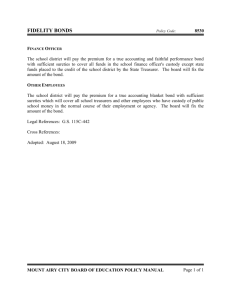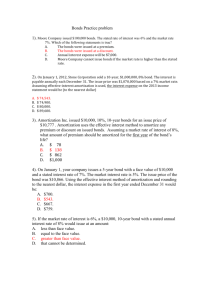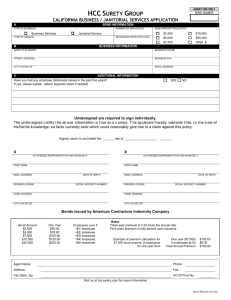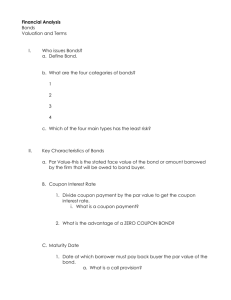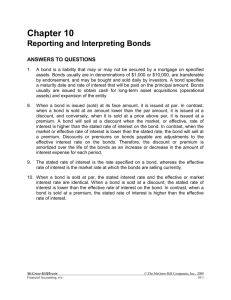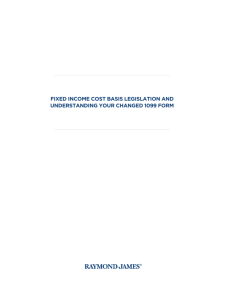Tax Treatment of Premium and Discount Bonds
advertisement
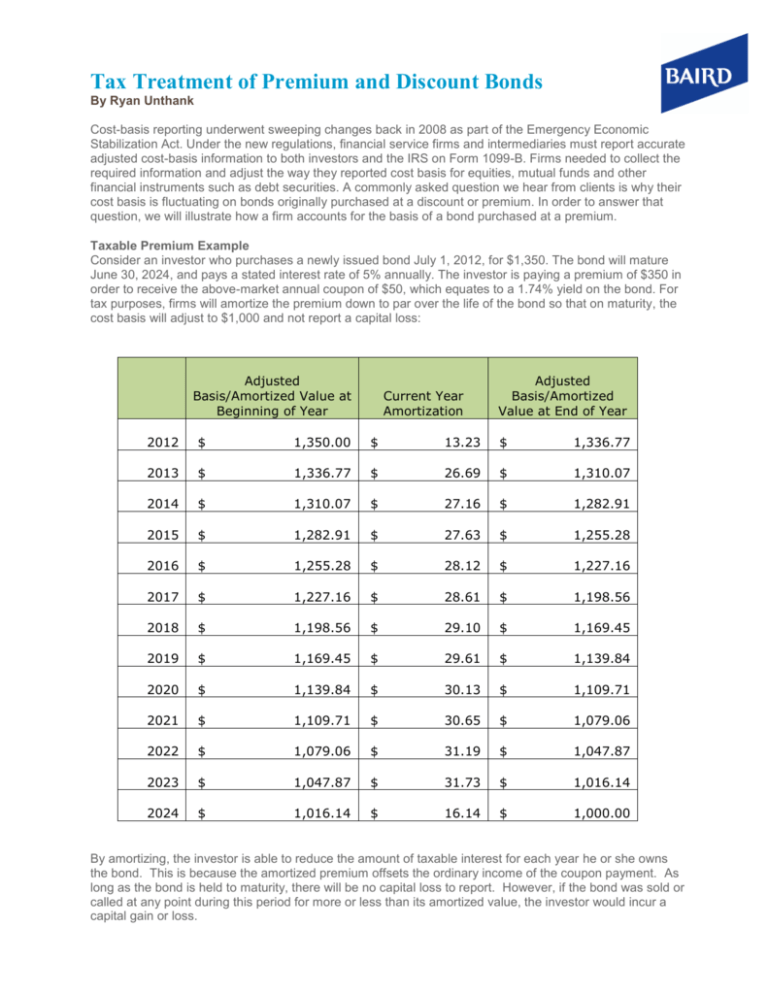
Tax Treatment of Premium and Discount Bonds By Ryan Unthank Cost-basis reporting underwent sweeping changes back in 2008 as part of the Emergency Economic Stabilization Act. Under the new regulations, financial service firms and intermediaries must report accurate adjusted cost-basis information to both investors and the IRS on Form 1099-B. Firms needed to collect the required information and adjust the way they reported cost basis for equities, mutual funds and other financial instruments such as debt securities. A commonly asked question we hear from clients is why their cost basis is fluctuating on bonds originally purchased at a discount or premium. In order to answer that question, we will illustrate how a firm accounts for the basis of a bond purchased at a premium. Taxable Premium Example Consider an investor who purchases a newly issued bond July 1, 2012, for $1,350. The bond will mature June 30, 2024, and pays a stated interest rate of 5% annually. The investor is paying a premium of $350 in order to receive the above-market annual coupon of $50, which equates to a 1.74% yield on the bond. For tax purposes, firms will amortize the premium down to par over the life of the bond so that on maturity, the cost basis will adjust to $1,000 and not report a capital loss: Adjusted Basis/Amortized Value at Beginning of Year Current Year Amortization Adjusted Basis/Amortized Value at End of Year 2012 $ 1,350.00 $ 13.23 $ 1,336.77 2013 $ 1,336.77 $ 26.69 $ 1,310.07 2014 $ 1,310.07 $ 27.16 $ 1,282.91 2015 $ 1,282.91 $ 27.63 $ 1,255.28 2016 $ 1,255.28 $ 28.12 $ 1,227.16 2017 $ 1,227.16 $ 28.61 $ 1,198.56 2018 $ 1,198.56 $ 29.10 $ 1,169.45 2019 $ 1,169.45 $ 29.61 $ 1,139.84 2020 $ 1,139.84 $ 30.13 $ 1,109.71 2021 $ 1,109.71 $ 30.65 $ 1,079.06 2022 $ 1,079.06 $ 31.19 $ 1,047.87 2023 $ 1,047.87 $ 31.73 $ 1,016.14 2024 $ 1,016.14 $ 16.14 $ 1,000.00 By amortizing, the investor is able to reduce the amount of taxable interest for each year he or she owns the bond. This is because the amortized premium offsets the ordinary income of the coupon payment. As long as the bond is held to maturity, there will be no capital loss to report. However, if the bond was sold or called at any point during this period for more or less than its amortized value, the investor would incur a capital gain or loss. Bonds that are purchased at a discount are adjusted in a similar manner. The primary differences are that the discounted bond accretes to par over the life of the investment and the annual accretion is recognized as ordinary income for tax purposes. Tax-Exempt Bonds Because the interest on municipal bonds is exempt from federal income taxes, the accretion to par for original issue discount bonds is not subject to ordinary income taxes. However, the cost basis will still adjust upward to par as the bond ages. Premium municipal bonds will also amortize downward to par, as we illustrated in the taxable premium example. But unlike taxable bonds, the amortization cannot be treated as an ordinary loss. The lone exception where an adjustment to par triggers a taxable event is market-discount munis. A market discount on a tax-exempt bond arises if: 1. The bond is issued at par or at a premium and is later purchased in the secondary market at a price less than par. 2. The original issue discount bond is purchased in the secondary market at a price less than the adjusted cost basis. Unlike original issue discount, the market discount does not qualify as tax-exempt interest and the holder must recognize the gain as ordinary income. Ryan Unthank Analyst Wise Investor Group Robert W. Baird & Co. 866-758-9473 Connect with us on: Ryan is an analyst with The Wise Investor Group and partners with the portfolio management team to implement asset allocation changes in client portfolios on a daily basis. His area of expertise is in fixed income. Ryan holds a bachelor’s degree in finance from Virginia Tech. He is also a Level 2 CFA candidate. Robert W. Baird & Co. does not provide tax advice or services. Please consult with your tax professional. Robert W. Baird & Co. Member SIPC.
